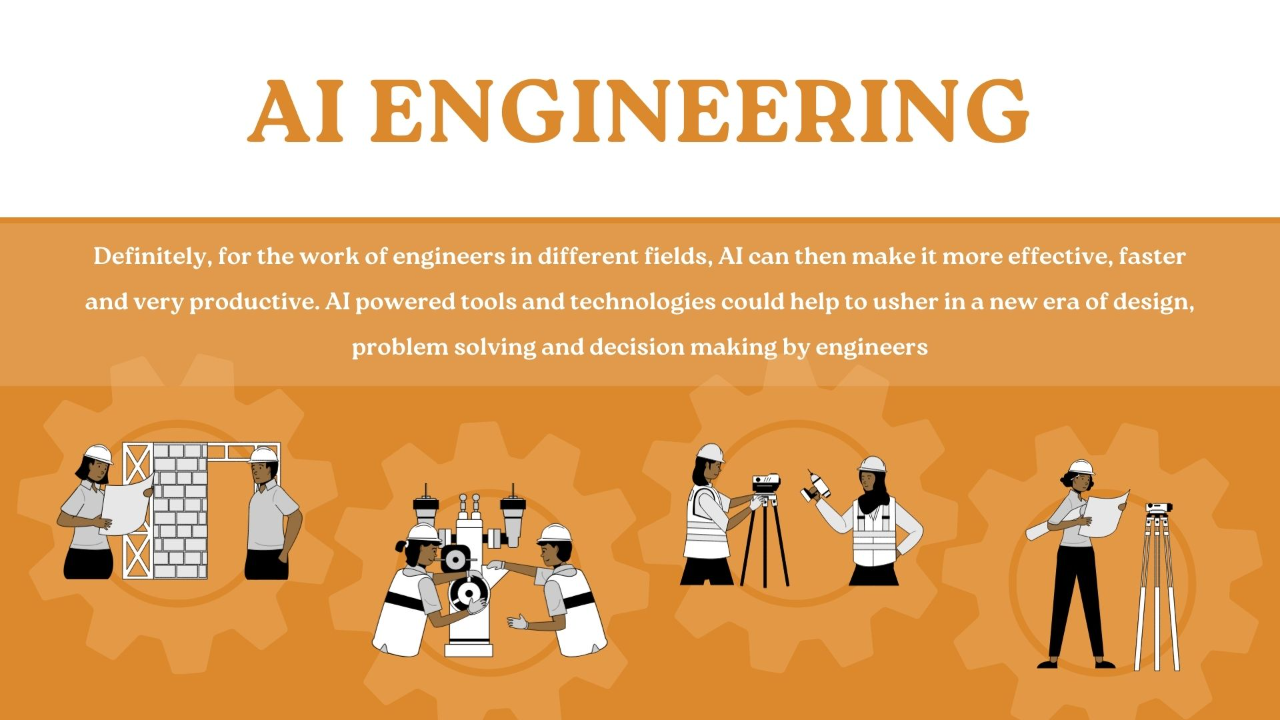Can AI Favour To AI Engineers? The Role of AI in Simplifying Engineering
Definitely, for the work of engineers in different fields, AI can then make it more effective, faster and very productive. AI powered tools and technologies could help to usher in a new era of design, problem solving and decision making by engineers. Below are some of the key ways in which AI can “favour” or support ai engineers. If you are a new in the filed of blogging or AI related blog then must visit our website and feel free to contact with our team www.blogtechai.com

What is an AI Engineer?
Although artificial intelligence (AI) is no longer an alien word, it is still in its infancy in many regard. This is a rapidly growing field, transforming industries across the board from healthcare to finance, transportation, and endless others. AI engineers are essential to the revolution around AI because they are the ones that design and execute AI technologies that make these innovations possible.
An AI engineer is a particular form of the specialised software engineer whose job duty is of developing and building AI systems. These experts are skilled at programming, machine learning (ML), data science and algorithms which are combined in creating intelligent solutions to automate processes, resolve difficult problems and make decisions.
What Does an AI Engineer Do?
There is a role for every person: AI engineers build AI models, train algorithms, and create software that allows machines to do what humans normally can. They work on a wide range of projects, such as:
- Machine Learning: In building algorithms that are used by systems to learn from data and become better over time, the term AI engineers is often used.
- Natural Language Processing (NLP): And they build things that can hear and speak human language, like chatbots or voice assistants.
- Computer Vision: The AI engineers have created systems so that the machines could understand visual data such as identifying an object in an image.
- Robotics: But some AI engineers specialise in creating intelligent robots that would be capable of interacting with their environment and do tasks independently.
AI engineers are working on building the algorithms and systems that are powering the hero technologies — from healthcare to finance, automotive to entertainment.
The Role of AI in Simplifying Engineering
1. Automating Repetitive Tasks
The biggest advantage of AI is that it can automate repetitive and time eating tasks. This can all be for engineers to automate the data entry, the running of simulations, testing and designing or schedule management. These processes can be streamlined using AI tools and engineers freed to tackle more complicated and creative tasks that only humans can handle.
Example:
Software Engineering: The use of AI tools in software engineering is such, that the AI tools can automatically test written code, finding bugs or security vulnerabilities without human intervention.
2. Design and Performance Optimization
The ability of AI to process large amounts of data and suggest improvements, can help engineers optimize designs and systems. Special relevance is given to such fields as civil engineering, mechanical engineering, and aerospace engineering that involve design whose performance criteria must satisfy certain requirements (load-bearing capacity, efficiency of energy consumption, etc.).
Example:
AI algorithms in civil engineering can bring materials and environmental conditions, and suggest the most efficient and durable ones for your construction projects, possibly reducing costs and environmental impact.
3. Accelerating Decision-Making
As engineers can help AI in becoming more informed and data driven decisions. Very limited data set, but it can process it very quickly to determine the pattern that may not be clear to the human. It makes stuff more predicted and faster to solve.
Example:
Electrical Engineers: The use of AI to forecast energy demand spikes and make real time grid optimization suitable for the electrical engineers working on the power grids helps in optimizing grid operations, improving efficiency, while minimizing outages.
4. Holding their testing and enhancing their simulations.
AI can enhance simulations and virtual testing in a number of different engineering fields. Instead, engineers can leverage AI driven simulation software to test how the principals of different designs will behave under all the possible conditions without having to physically build prototypes. It greatly reduces time and expense in development.
Example:
AI is used by automotive engineers to simulate vehicle crash tests or aerodynamics, only to make the safety features or fuel efficiency better, before building physical prototypes.
5. As a result, the Accuracy and Precision are better.
With AI, engineering processes become more accurate and precise than humans alone. By providing engineers with a mind to assist in the design of more precise machines, tools or products, AI systems enable higher levels of quality outcomes.
Example:
Within robotics itself, AI becomes useful to design robotic systems which can perform various tasks with incredible precision, say, in surgical robots or manufacturing robots that can assemble parts with almost no human intervention.
6. Predictive Maintenance, Failure Prevention
By analysing historical data, AI powered tools can predict when machines or equipment will fail ahead of the problem becoming serious. It may prevent costly breakdowns and will help minimizing downtime in manufacturing, aerospace, and automotive engineering.
Example:
AI can be used by mechanical engineers working in manufacturing facilities to help predict when machinery will need maintenance in order to schedule repairs before an entire piece of machinery breaks down.
7. Enhancing Collaboration
AI tools can enhance collaboration between engineers as well as between engineers and cross functional teams. AI can automate project management by tracking progress and providing real time updates, making engineering teams work together more efficiently.
Example:
Project management software powered by Artificial Intelligence can assist construction engineers in overseeing timelines, budgets, and resource handling smoother, which in turns sole easier collaboration with architects, field engineers, and other team members.
8. Enabling Innovation
That ability to try things that you wouldn’t think of otherwise, I think, gives AI the potential to help engineers tackle more complex and innovative problems be it by new ways of thinking, be it simulating what might happen, be it suggesting creative ways to solve it.
Example:
AI is used in electrical engineering to design new types of energy storage system, either through improved energy grid efficiency or battery capacity.
Engineering Made Easier with AI.
Sure, AI doesn’t just ‘favour’ AI Engineers by automating their tasks, it makes their work more manageable, productive, and impactful. Here’s a breakdown of how AI Engineers can benefits from them:

1. Streamlining Workflow
Repetitive tasks such as scheduling meetings, organizing data, or responding to a simple query can be automated by way of AI, saving engineer hours to work on higher level problem solving.
2. Supporting Decision-Making
Exploiting large datasets, AI can assist engineers to make better choices faster by automating the process of doing their manual analysis and trial and error.
3. Improving Accuracy
With such more accurate results, AI models can detect patterns, analyze variables and test designs better than before, lessening errors and making its results more reliable.
4. Increasing Efficiency
AI does time consuming tasks likes upsampling and simulations and engineers can therefore complete more tasks faster, thus reducing product development cycles.
5. Enhancing Safety
Among critical applications, AI can help in identifying safety risks before they reach a dangerous stage, preventing accidents or corruption of the system in case of aerospace engineering or civil engineering.
Conclusion:
AI Is A Game Changer for Engineers While people may consider only the technology inventor as the domain for which AI is appropriate, things are changing. In fact, AI is changing engineering for the better by optimizing design, automating tasks, enriching decision making and making it safer.
That’s why AI can really help engineers save time, and reduce errors and make more informed decisions. When AI keeps progressing, the next future of engineering would be much more linked with the AI leading to the new opportunities and more powerful technological solution.
As engineers, we’re increasingly making AI an essential partner, allowing us to work smarter, faster, and more efficiently. AI frees engineering professionals to create better products, innovate more quickly, and tackle more difficult challenges.
F.A.Qs
1. What does AI do to benefit engineers in everyday tasks?
By automating repetitive tasks, optimising design, improving simulation, to offering real time data analysis; AI is helping engineers to spend more time on more complex and more creative problem solving.
2. Can AI replace engineers?
The idea behind AI is that it will **help** engineers, not replace them. Automating some tasks, it frees some human time, but there’s still need for human experience and imagination in more complex decision making and invention.
3. Does AI assist in predictive maintenance for engineering projects?
Of course, AI can analyze historical data to predict when machinery or equipment could be about to fail. By doing this, engineers can schedule maintenance ahead of time so that they don’t need to wait in downtime to get their repairs done, thereby avoiding costly repairs.
4. What programming languages do the programmer of AI use?
AI engineers usually implement this work using the programming languages Python, C++ and Java. Phenomenal because of its rich libraries and frameworks for development of machine learning and AI applications, python is also extremely popular.
5. What industries make the most from AI in engineering?
From Automotive, Aerospace, Construction, Manufacturing, Civil Engineering, Electrical Engineering, we show AI benefits a wide range. AI is used efficiently in each of these sectors, to optimize designs, improve safety and efficiency.
